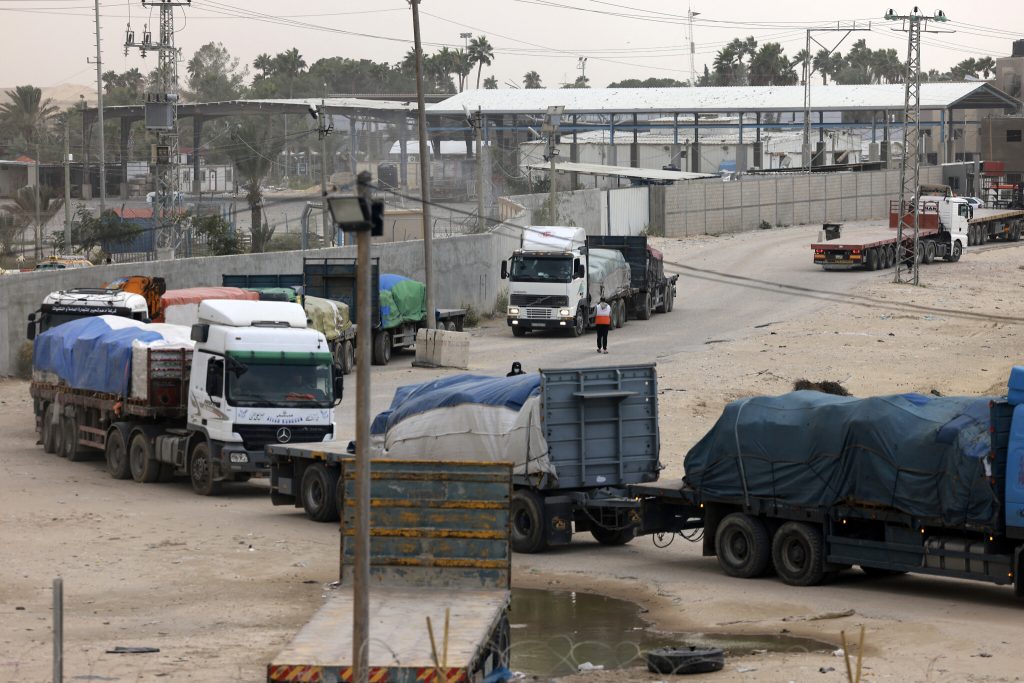Famine-hit Sudan camp gets first aid convoy in months
3 min read
A famine-hit camp in Sudan, which shelters approximately 500,000 displaced individuals, has finally received its first food aid convoy in months. The United Nations’ trucks arrived in Zamzam camp, located near Darfur, on Friday. This camp has become a refuge for those fleeing the violence of Sudan’s 18-month civil war, which has devastated the country and displaced millions.
The food deliveries were severely delayed due to intense fighting between Sudan’s army and the paramilitary Rapid Support Forces (RSF), as well as the region’s impassable roads, worsened by the seasonal rains. The ongoing power struggle between the two factions has created what the United Nations describes as the world’s largest humanitarian crisis. Since the conflict began, more than 10 million people have been forced from their homes, and the situation has led to widespread hunger.
In August, an independent group of food security experts confirmed that Zamzam had been plunged into famine. Famine conditions are defined by several critical indicators, including that at least 20% of households experience extreme food shortages, 30% of children suffer from acute malnutrition, and daily deaths occur due to starvation or malnutrition-related diseases. According to the World Food Programme (WFP), the conditions in Zamzam are dire, and the food convoy represents a vital lifeline for these vulnerable people.
The aid convoy to Zamzam is part of a broader effort by the WFP to reach the most isolated and conflict-affected areas. Three large convoys, totaling over 700 trucks, have been dispatched to deliver food to 1.5 million people for over a month. The WFP has made it a priority to address the needs of Sudan’s most affected regions, which have been cut off from assistance for months. In addition to food aid for Zamzam, supplies are also being sent to South Kordofan state, another area severely affected by the conflict.
Laurent Bukera, the WFP’s regional director for eastern Africa, emphasized the importance of the aid convoys, stating, “These trucks carry more than just food; they carry a lifeline for people caught in the crossfire of conflict and hunger.” He also stressed the need for secure passage for the convoys, adding that international support is crucial to ensure aid reaches every family at risk.
The delivery of aid to Zamzam was made possible after months of delays. The convoy, which departed from Adré on the border with Chad on November 9, took a critical route that had been closed by the Sudanese government in February. The army-controlled government had ordered the closure of this corridor, citing security concerns, including the potential for the RSF to use it for transporting weapons. In August, the route was briefly reopened for a three-month period. Despite objections from the Sudanese government, which argued that the reopening would allow arms to flow to the RSF, the government has agreed to keep it open for another three months to facilitate humanitarian deliveries.
The conflict has significantly hampered efforts to bring aid to the country. Both the Sudanese army and the RSF have been accused of blocking and looting humanitarian aid, although both factions deny these allegations. The dire situation has been compounded by the logistical challenges of delivering aid in a war zone, where insecurity and violence have made it difficult for aid organizations to access those most in need.
In addition to the convoy from Adré, a second shipment of WFP aid, which left Port Sudan, the country’s only operational port, 10 days ago, is also en route to the Zamzam camp. This dual effort aims to alleviate the suffering of the displaced populations in Darfur and other affected regions.
As the humanitarian crisis deepens, the WFP and other international organizations continue to call for guaranteed safe passage for their convoys, urging all parties to the conflict to ensure that aid reaches those who need it most. The arrival of these aid convoys marks a rare moment of hope in a region battered by conflict and hunger, but much more aid is needed to address the growing crisis.
With the future of millions of Sudanese at stake, the world’s attention remains on the escalating conflict, as well as the urgent need for a peaceful resolution to allow for sustained humanitarian efforts and the restoration of stability in Sudan.







